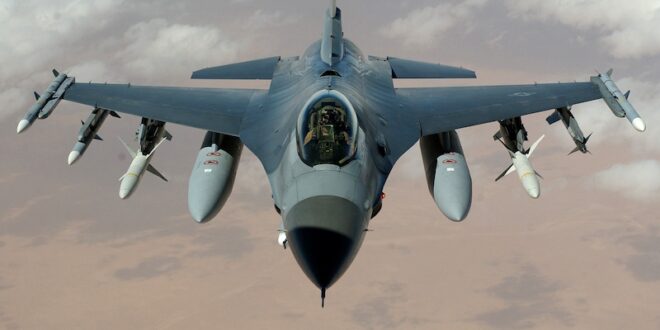Germany will not participate in an international coalition to provide Ukraine with fighter jets and will instead focus on continuing to deliver tanks, ammunition, and repairing equipment, Chancellor Olaf Scholz said on Wednesday. Meanwhile, there is still uncertainty regarding the UK’s announcement about such a coalition.
The move comes one day after the UK government announced that it agreed with the Netherlands to form a cross-country coalition to help Ukraine procure F-16 fighter jets.
While the Hague insisted that there had been no concrete deal, Germany clarified that it would not be a part of it.
“There are no demands regarding us,” Scholz said regarding the delivery of fighter jets in Reykjavik after a summit of the Council of Europe on Wednesday.
He added that the question about Germany’s role in the proposed coalition was not a topical one.
The German defence minister Boris Pistorius made similar remarks the day after a meeting with his British counterpart, Ben Wallace.
“We cannot play an active role in such an alliance, in such a coalition, because we have neither the training capacities, the competencies or the planes,” Pistorius argued, pointing out that Germany didn’t have F-16 jets and its own models would be unsuitable for Ukraine in the short-term.
Unlike in previous debates about arms deliveries, the German government thus appears to be largely united regarding fighter jets.
“I have said early on that I don’t see [German] Tornado and Eurofighter jets [operating] in Ukraine’s airspace, and the majority of my colleagues agree,” Marie-Agnes Strack-Zimmermann, an MP from Scholz’s liberal coalition partner FDP and chair of the parliament’s defence committee, told Deutschlandfunk on Tuesday.
In the past, she had vocally pushed the chancellor to step up Germany’s engagement regarding weapon deliveries, including on the matter of tanks.
Nevertheless, the government is not fundamentally opposed to the delivery of planes per se.
It recently greenlighted Poland’s request to pass on Soviet-era jets to Ukraine. Germany’s approval was necessary as the warplanes previously belonged to its army, which had inherited them from the supplies of communist East Germany.
Dutch, UK fighter jet deal for Ukraine in murky waters
Meanwhile, the so-called “international coalition” created by the Netherlands and the UK to help Ukraine procure F-16 fighter jets – is shrouded in uncertainty.
A spokesperson for Dutch Prime Minister Mark Rutte said there had been no concrete agreement regarding the purchase or delivery of these fighter jets.
Particularly, on Wednesday, a spokesperson for Rutte told NRC Handelsblad that there are “no concrete agreements” concerning the “purchase or delivery” of F-16 fighter jets between the two countries.
Nonetheless, the spokesperson stated that Rutte promised British Prime Minister Rishi Sunak to “keep in close contact concerning support to Ukraine.”
The topic is “very sensitive”, Foreign Minister Wopke Hoekstra (CDA/EPP) said during a press conference, which is why Dutch governmental institutions have not officially confirmed the agreement. He also called for caution due to the fact that “everything is bugged, including by Russia”.
“We [can] only come forward when the whole route has been walked. […] I also [think] it is not wise, towards all the sensitivities and allies, to make a statement earlier,” Hoekstra stated, adding that “very intensive contact with European and North American colleagues” is currently taking place.
The reservedness of the Dutch side starkly contrasts the language used by the British government.
In a press release from Tuesday, Downing Street emphasised that the two countries will “build [an] international coalition to provide Ukraine with combat air capabilities, supporting with everything from training to procuring F16 jets.”
The delivery of F-16s has long been perceived as a “red line” for Western military support to Ukraine, as many fear repercussions from Russia.
Last week, the Belgian government announced a new aid package to Kyiv amounting to €92 million from the tax revenues earned on Russian financial assets frozen in the country. Half of this aid will be spent on military aid and the other half on humanitarian assistance, among other things.
The country also said it was ready to train Ukrainian pilots to use F-16s.
However, Belgian Defense Minister Ludivine Dedonder said that the country could not send its F-16 planes to Ukraine because they were “reaching the end of their life cycle.”
 Eurasia Press & News
Eurasia Press & News


